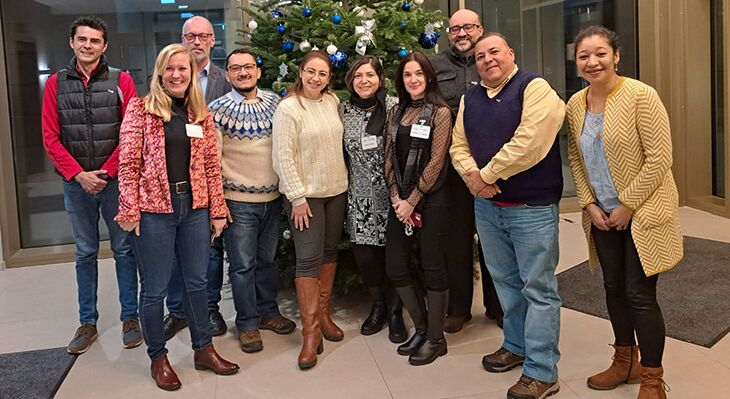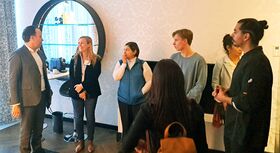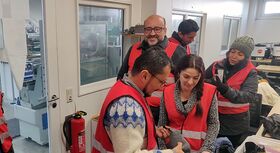Tourism: modern vocational training as a solution to the shortage of skilled workers
18.01.2023
The tourism industry offers many training opportunities and yet struggles with declining training numbers. On the other hand, dual VET secures the skilled workers of tomorrow - but how exactly is it implemented? GOVET visited companies, schools and chambers with a delegation from Costa Rica.

During the study visit of a seven-member delegation from Costa Rica, the focus was on training in the tourism sector. Tourism, hotels and restaurants contribute significantly to the gross domestic product with their services and products. In Germany with about 4 % and in Costa Rica with about 6.3 %. At the same time, there is an enormous shortage of skilled workers in the industry in both countries. Training in the sector is therefore more important than ever, as it secures the skilled workers of tomorrow. One more reason for the delegation from Costa Rica to approach the topic and learn more about dual VET in Germany. The delegation was made up of members of the regional directorates and the board of INA (Instituto Nacional de Aprendizaje, state provider of initial and continuing vocational training).
Anita Milolaza, research associate at BIBB, accompanied the reorganisation of tourism occupations. Two new training occupations were created at the beginning of the 2022 training year: Kitchen Specialist and Catering Specialist. These new training occupations bring with them a special feature, as they are two-year training programmes. They complement the previous three-year training as a cook or restaurant specialist. The aim of shortening the training is to attract more people who find a three-year training too long. In addition, the two-year training courses open up a fall-back option for people who do not successfully complete the three-year training as a cook or specialist for restaurants and event catering: in future, they will have the option of falling back to the two-year qualifications and still obtaining a recognised training qualification.
The training regulations for the five existing occupations in the tourism sector have been modernised. Anita Milolaza also explained to the Costa Rican delegation the content structure of the occupational cluster, which now consists of a total of seven occupations. The cluster is divided into hotel, restaurant and cook occupations. The contents of the first year of training are the same for the entire occupational cluster, while in the second year specific contents for each occupational group are on the curriculum. In the third and final year of training, the contents are then specific to each vocational training occupation.
New legislation in Costa Rica as a basis for new training programmes
The Costa Rican delegation participants reported on their experiences in dual VET in tourism. The participants were impressed by the duration of the training programmes in Germany. INA has already had a lot of experience with dual VET in tourism over the last 20 years, especially for cooks. However, the training programmes covered a considerably shorter period of time, usually not exceeding one year.
In 2019, a new legislation on dual VET was introduced in the country. Currently, INA is in a phase of adapting existing and developing new training programmes in interaction with other national actors, such as the Costa Rican Ministry of Education. A critical point here is the involvement of the private sector through sector representatives, emphasised Ronald Bolaños, member of the INA board.
Only continuous training in the various apprenticeship occupations in the sector can ensure that the demand for future skilled personnel is met, said Mathias Johnen, who as deputy managing director of the industry association DEHOGA Nordrhein is also responsible for the Cologne/Bonn region. He pointed out the importance of training for a sustainable supply of skilled labour in the sector. The apprenticeships in the management sector (hotel specialist, hotel management clerk) are also important. This makes the training path more attractive for young people with high school diplomas and promotes the topic of training as a possible career path in the management sector. DEHOGA supports businesses in their commitment to training by providing information on the legal basis. It is represented at training fairs and promotes occupations in the sector there. In addition, DEHOGA supports businesses through exchange programmes.
Theory meets practice: Insights into everyday German training in tourism

The delegation participants learned how in-company training is implemented in the tourism industry in two company visits. At the Kameha Grand Hotel Bonn, hotel director Andreas Graeber-Stuch, together with his team and his trainees, provided insights into the processes of a large hotel. The Kameha Grand Hotel has three restaurants (including a Michelin star restaurant), its own spa and a variety of event and congress facilities. By allowing the trainees to rotate through the many different departments and restaurants of the hotel, they want to make the training attractive, says Graeber-Stuch. The company currently has almost 30 apprentices.
At the German Youth Hostel Cologne-Riehl (DJH), kitchen manager Reiner Schopen welcomed the delegation and showed with contagious enthusiasm how inclusion of people with disabilities in the company and even training can succeed. The DJH cooperates with the non-profit company ProjektRouter. Together they support people with disabilities to take up an inclusive career path within a regional company. Currently, for the first time and as the only hotel business in the whole region, the DJH has three trainees with special needs in two-year apprenticeships. They go through the complete training and are supported by additional coaching, promoted by ProjektRouter. At DJH, it is important to employ all people according to their talents and interests, Mr. Schopen emphasised the philosophy of the hotel, which is highly appreciated by the guests.

The visit to GKN Sinter in Bonn Mehlem gave the delegation another impression of in-company training, but this time in the environment of a manufacturing company. GKN Sinter produces metal parts for engines and machines, mainly for the automotive industry. Frank Prokop, head of training at the location, conveyed in a very practical and understandable way how the operational processes can convey the training contents. It is important that companies have enough flexibility to carry out the training - a point that was particularly impressive for the INA representatives. Up to now, companies in Costa Rica have been given very precise, hour-based plans that have to be worked through for the part of the in-company training. Then delegation participants agreed that this should be done differently in the future.
The visit to the Bonn-Rhine-Sieg Chamber of Industry and Commerce and its joint training workshop in Siegburg once again made clear to the participants the investments that companies in Germany make to train people in companies and thus secure their future skilled workers. Jürgen Hindenberg, Managing Director of the Bonn-Rhein-Sieg Chamber of Industry and Commerce and Head of the Training Department, presented clear figures in this context: Despite the great commitment of companies to training in the region, it is estimated that in 2030 almost 40,000 jobs cannot be filled because the skilled workers for them are lacking.
In addition to training companies, GOVET and the delegation also visited the Robert-Wetzlar-Berufskolleg. The vocational college is the vocational school responsible for theoretical training in tourism and catering professions in the Bonn-Rhein-Sieg district. Headmistress Birgit Hufnagel and Sabine Bartsch, head of the hotel and catering department, shared with the delegation insights into the diverse tasks and challenges of a vocational school. The importance of vocational schools as actors in the dual VET system, together with companies and chambers, also became clear. Four students shared their very personal experiences of vocational training with the delegation.
In the final workshop with GOVET, the participants summarised the most important results of the study tour. They agreed that they would benefit in particular from the deeper understanding of the dual VET system. For the Costa Rican context, the view of the various actors in the German dual VET system with their clearly defined roles was particularly relevant. Furthermore, the Costa Rican delegation was impressed by the high flexibility of the dual VET system in Germany. Another important point was the strong involvement of the private sector at all levels of the dual VET system.